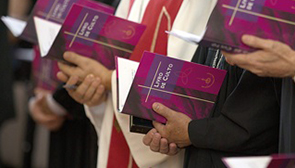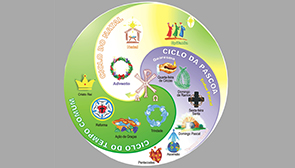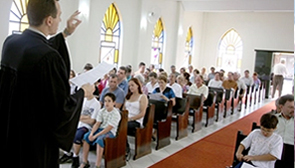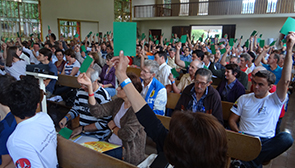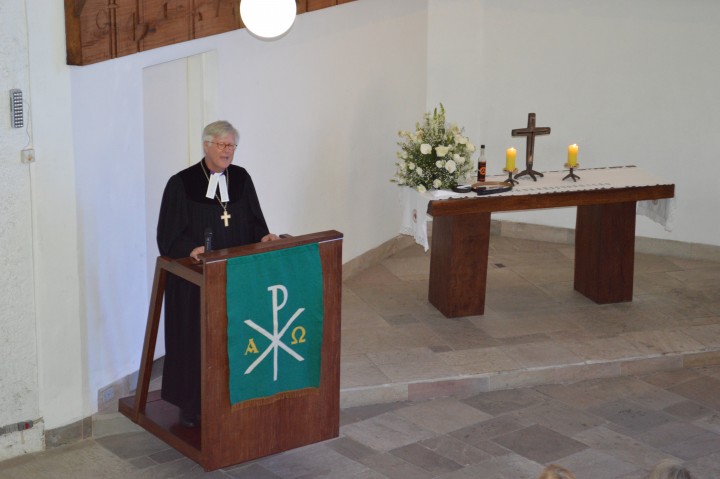
Sermon Bishop Dr. Heinrich Bedford-Strohm
Text: Luke 14:25-33
Dear sisters and brothers
These words from the Gospel of Luke unsettle us, unnerve us, cause us to feel insecure. It would be difficult to describe Christian discipleship in a more radical manner than Jesus does in this passage. Could this really be following Jesus? To hate one’s mother, hate one’s father, hate one’s wife, hate one’s children, hate one’s sisters and brothers and, beyond this, hate oneself?
If we wanted to take these descriptions of Christian discipleship literally, we would have to lose hope with regard to them, since we would have to accept as programmatic orientation something which today, can only be seen as a description of symptoms of a very severe psychiatric disorder.
From this point of view, our community of partner churches – churches which have made following Jesus the central content of their life – would have to be labeled as an association which constitutes a public danger for calling on people to hate one another and themselves. If this were the case, it would be recommended that the people responsible for the public security of the nation keep very close watch over our consultation, here where are gathered this gang of hate preachers.
I do not see here, in any place, men with earphones watching over this meeting. And, fortunately, they are not needed, because those gathered here are not hate preachers, but heralds of love. They are people who are committed to the task of proclaiming to the whole world the message of love. People who struggle for a world in which love defines human words and actions. People who seek their inspiration in Jesus. People who wish to testify with their life today the discipleship which Jesus requires of his disciples with such incisive words.
The discipleship of Christ today is not the same thing as the following of Jesus of that time. Jesus lived as an itinerant preacher. He gathered around him people who decided totally for him and because of this, left their families of origin. And he was very frank with them: You must know what you are getting involved in. Whoever wants to follow me needs to make a cut in his life. And whoever takes on this commitment must count on all possibilities, of persecution, of the cross, even of death. Who is the king, when going into combat with another king, does not first sit down to calculate if with 10 thousand men he will be able to face who comes against him with 20 thousand? If he cannot, the other still being far away, he will send out an emissary asking for the conditions of peace. The same applies to everyone among you who does not renounce all that they have. Therefore, think well about what you are getting involved in!
Today we know how much this warning of Jesus was justified. Jesus followed the path of the cross. And some of his disciples were killed for being his followers.
But Jesus resurrected! This good news has spread throughout the whole world. And, 2 thousand years later, we know of various ways of following Jesus in the most diverse contexts of the world. In any case, no one who can be taken seriously can affirm today that the only way to be a Christian would be to live as an itinerant preacher.
No one can substitute us in the task of clarifying always and in new ways, for our respective times and our respective context what following means. The actuality of the reference to the cross made by Jesus in this text is shown by the situation of Christian people who suffer persecution today because they give witness to their faith. Some of you know, by your own experience in your country of origin what I am talking about.
Where this does not happen, like, for example, in my country, Germany, we can only be extremely grateful for this. Suffering because of the faith is always a threshold situation. One must never wish for this suffering. No one knows this better than the people who have felt this suffering in their own skin. Whoever ties the unequivocal nature of Christ’s discipleship to the measure of suffering and wishes for it to show the strength of the witness of faith, transforms the cross into an end unto itself and thus, perverts its meaning.
Jesus never wished to say something like that. What one aims for in following Jesus is life. What one aims for is giving food to the hungry, drink to the thirsty, clothing to the naked, not let someone alone who is in prison, visit the ill, welcome in the sojourner. And what one aims for is that violence will be overcome! The violence which takes Jesus to the cross is the expression of human sin. Jesus overcame sin. And that is why all people who follow him get involved so that violence, which is a consequence of sin, can also be overcome.
If there can be situations – for example, mass assassinations such as the genocide which occurred in Rwanda – where, also from the Christian point of view, the use of violence could be seen as inevitable, if there can be situations like these that is a difficult issue. At the General Assembly of the World Council of Churches in Busan, in the beginning of November we will be discussing this issue intensively. But all agree that overcoming violence is part of the essential dimensions of the mission which the Gospel places on the churches. The world assembly of the churches dealing with overcoming violence which took place in Kingston, Jamaica, two years ago, presented many impressive examples of how the churches can contribute to this with concrete projects.
The involvement of the church in overcoming violence is just one field in which the validity of what Jesus said about discipleship using the image of salt needs to be proven: “Salt is certainly good; however, if it loses its taste how does one restore the flavor? It doesn’t serve for the earth, nor even for the dung heap; throw it out. Whoever has ears to hear, listen;”
How can we be salt today? In any case, it is not simply parroting what the world says, letting go of the theological profile to not demand anything from anyone. Letting go of the truth to remain important. In fact, an insipid salt serves neither for the earth nor the dung heap, but will be thrown out.!
But we also cannot be salt by building a “counter-world”, and, in the end, leaving the world which we want to transform alone. What use is a portion of salt which simply stays with itself? The grains of salt may consider themselves extremely salty, but if they do not enter anything to salt it they serve for nothing. The salt will be thrown there all alone and eventually will end up being ruined.
Moral criteria can be put so high that one can easily escape from them without transforming absolutely anything. And a supposedly prophetic discourse which is lifted above the other people and simply ignores what they are going through in the midst of their dilemmas will end up revealing itself, in the end, as only vanity and self-righteousness disguised with much skill.
To be salt today means something else. It means, before anything else, a deep love for the world in which it intends to be salt. It means to feel one’s heart burn for the people who live in this world, regardless of what side they find themselves on. It means to serve the people who are in special need of support, whose dignity is being violated. It means to raise one’s voice and speak out clearly if that is what it takes for people to reflect and for transformations to be unleashed.
To constantly receive strength for this task we need communion and congregations. We need the larger communion and congregation of the Church. It connects us with the people throughout time who have been the bearers of the message of the love of God in Jesus Christ ever since that time to this. Without them we would not even have knowledge of this message. And it connects us with the people, who, today, always come back to gather around Christ and who feel his strength among them. It is good to be aware of this communion of the church and feel it, even if the people that are part of it live very distant from each other. And it is good that we can experience directly, through the communion of our partner churches, the unity in Christ which surpasses national and cultural limits. That is why this consultation is a great gift. Through the friendship which we feel together, through the discussions which we have with each other, through prayer which unites us with God and also, in the depth of the soul, unites us to each other, Christ is among us.
This is what we can celebrate today. We praise God for having each other. We thank God for, through his Spirit, opening our hearts always to each other and to the world. We ask God to strengthen us in love.
And may the peace of God, which surpasses all understanding, keep your heart and mind in Christ Jesus. Amen.



